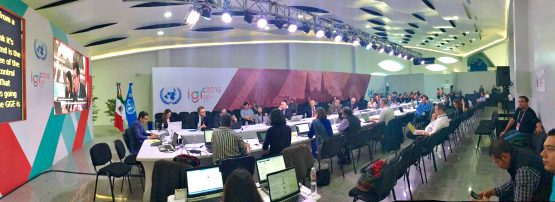
Recently I participated in the 11th Internet Governance Forum (IGF) in Mexico. The IGF is the only global forum where governments, private sector, the technical community, academia and civil society can meet together to discuss public interest and governance issues relating to the Internet.
APNIC attends the IGF, along with other technical community organizations, to ensure our role is understood and to promote technical issues that are important to our Members and community. These include IP addressing, Internet infrastructure and related security issues, and also the importance of ‘human capacity building’ (that is, training, professional development, and technical assistance) in Internet development.
I had several opportunities during the IGF to talk about the importance of human capacity in the development of Internet services, which is often taken for granted in IGF discussions. I stressed that in any market, developed or developing, the difference between a stable, affordable, and secure Internet service – and one that is none of these things – can be solely a matter of the human skills available to properly build and operate those services.
The role of expert professionals in building the Internet is critical, but in reality, many network operators, particularly in developing economies, struggle to provide state-of-the-art services. There are enormous challenges in growing and maintaining reliable, modern, 24×7 services while also dealing with additional challenges like IPv6 deployment, new technologies, and increasing security threats. A lack of skills and capacity results in network services that are less efficient, reliable and secure, and therefore also more costly than they should be. On the global Internet, insecurity and inefficiency in one part of the network will always create problems elsewhere.
Globally, and at the highest levels, we need to invest in supporting network engineers to do their jobs to the highest global standards throughout the developing world. This means training and education, professional networking, and exposure to best practices for dealing with today’s challenges. These skills cannot be acquired just once but must be maintained continuously to keep up with the ever-changing challenges of the Internet environment.
At the IGF there are many discussions on the Internet’s promise for social and economic development – through e-commerce, e-health, online education, training and employment, e-government, and many other services. These are all correctly identified as solutions for inequality and poverty, and there are many important discussions at the IGF about how they can be promoted and applied. But at the same time, they all depend on robust, efficient, secure and resilient Internet infrastructure: if that doesn’t exist, the opportunities to deliver those promised benefits diminish considerably.
The technical community, as part of the multistakeholder Internet community, has advocated for a long time for support of technical education and assistance, training and professional development, particularly through network operator groups, educational conferences, training workshops and fellowships.
The importance of human capacity may not be unique to the Internet as an infrastructure; the same applies to the construction of roads, power grids, health systems and the rest. But, it needs to be emphasized in a forum like the IGF, where so much depends on (and assumes) a robust Internet. This was my most important message to IGF 2016, and one that will need to be repeated again and again as time goes on.
Footnote:
APNIC has been involved in human capacity building for many years, providing training and education services, conferences and fellowships, which are all subsidized heavily by Member funds. We have recognized this need will continue, with demands beyond our capacity to fulfil; therefore, we have established the APNIC Foundation as a means to attract more resources and develop new projects in capacity building for Internet infrastructure development. We took the opportunity to promote the APNIC Foundation during the IGF, and hope that during 2017 we will start to see new activities to benefit Internet development in our region.
The views expressed by the authors of this blog are their own and do not necessarily reflect the views of APNIC. Please note a Code of Conduct applies to this blog.
